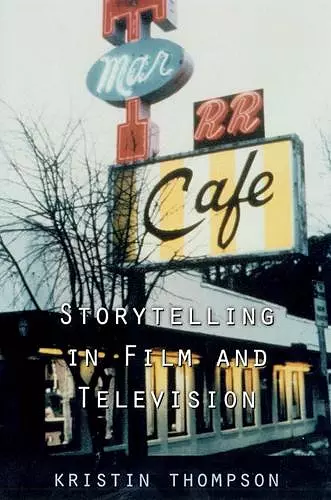Storytelling in Film and Television
Format:Paperback
Publisher:Harvard University Press
Published:30th Jul '03
Currently unavailable, and unfortunately no date known when it will be back

Remarkably little work (scholarly or otherwise) has been done on television. These four essays provide what may be the most cogent and systematic study of the subject currently available. Thompson is an extremely solid writer with a keen intellect and exceptional analytical skills, and all of these qualities are in evidence here. Simply stated, there is at present no book quite like this one, despite the pressing need for such a book. -- Thomas Schatz, Professor of Radio, Television & Film, University of Texas at Austin I quite enjoyed reading this book. What I like most about it is its interdisciplinary approach. It shows the insights that an intellectually mature media scholar can have when she crosses disciplinary boundaries--applying analytical principles of one medium to another. I feel strongly that this sort of work should be encouraged. -- Jeremy Butler, Professor of Telecommunications and Film, University of Alabama
Derided as simple, dismissed as inferior to film, characterized as a vast wasteland, television nonetheless exerts an undeniable, apparently inescapable power. The secret of television’s success may lie in the narrative complexities underlying its seeming simplicity, complexities the author unmasks in her analysis here.
Derided as simple, dismissed as inferior to film, famously characterized as a vast wasteland, television nonetheless exerts an undeniable, apparently inescapable power in our culture. The secret of television's success may well lie in the remarkable narrative complexities underlying its seeming simplicity, complexities Kristin Thompson unmasks in this engaging analysis of the narrative workings of television and film.
After first looking at the narrative techniques the two media share, Thompson focuses on the specific challenges that series television presents and the tactics writers have devised to meet them--tactics that sustain interest and maintain sense across multiple plots and subplots and in spite of frequent interruptions as well as weeklong and seasonal breaks. Beyond adapting the techniques of film, Thompson argues, television has wrought its own changes in traditional narrative form. Drawing on classics of film and television, as well as recent and current series like Buffy the Vampire Slayer, The Sopranos, and The Simpsons, she shows how adaptations, sequels, series, and sagas have altered long-standing notions of closure and single authorship. And in a comparison of David Lynch's Blue Velvet and Twin Peaks, she asks whether there can be an "art television" comparable to the more familiar "art cinema."
Remarkably little work (scholarly or otherwise) has been done on television. These four essays provide what may be the most cogent and systematic study of the subject currently available. Thompson is an extremely solid writer with a keen intellect and exceptional analytical skills, and all of these qualities are in evidence here. Simply stated, there is at present no book quite like this one, despite the pressing need for such a book. -- Thomas Schatz, Professor of Radio, Television & Film, University of Texas at Austin
I quite enjoyed reading this book. What I like most about it is its interdisciplinary approach. It shows the insights that an intellectually mature media scholar can have when she crosses disciplinary boundaries--applying analytical principles of one medium to another. I feel strongly that this sort of work should be encouraged. -- Jeremy Butler, Professor of Telecommunications and Film, University of Alabama
- Nominated for Katherine Singer Kovács Book Award 2004
ISBN: 9780674010871
Dimensions: unknown
Weight: 249g
192 pages